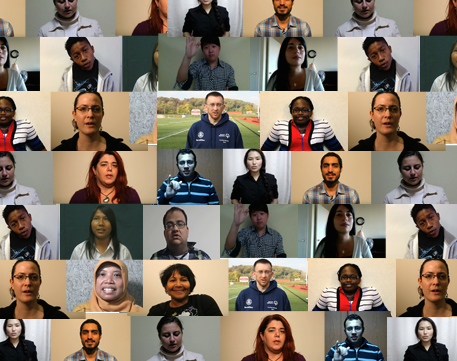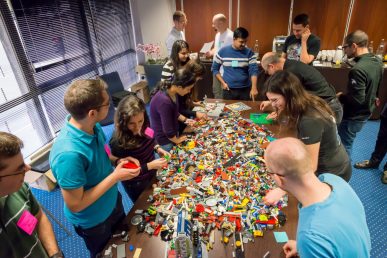LOS ANGELES — The expo hall booths were already packed up, but a few hundred Open Source Summit attendees returned to the JW Marriott to talk about some of the most persistent problems in tech at the first Diversity Empowerment Summit (DES).
The daylong get-together had a broad scope: diversity of gender, race, nationality and religion are all focus areas where initiatives aim to increase awareness and actions around increasing representation in open-source communities.
Only 3% of women are open source contributors in 2017 – @marinaz #OSSummit #DiversityEmpowermentSummit
— Alpha (@GaelleTjat) September 14, 2017
From game theory to chaos theory
Kate Ertmann kicked off DES by setting the stage for what’s happening when new generations enter the workplace.
“Millenials are making chaos in the workplace,” she said. “Generation Y and Generation Z will not tolerate when there is no diversity in the workplace and inauthentic attempts around being diverse. They will not tolerate when they are not reflected in the workplace.”
Ertmann said this illustrates a shift from game theory to chaos theory and the need to break down the 20th-century workplace to build anew.
Steps include reevaluating family leave, coverage for longer medical situations—particularly among all configurations of families—and flexible work hours. She applauded the onsite childcare offered at the Open Source Summit, which extended an opportunity to parents—and mothers in particular—who previously may have been unable to attend.
When asked by an attendee how to create a more welcoming workplace environment, Ertmann says “just ask. Creating feedback loops is the biggest opportunity to create a more inclusive workplace.”
Sometimes you need to break down old constructs to build up a new more inclusive world. @gok8 #LFDES pic.twitter.com/lpCXJUSMNR
— Nithya Ruff (@nithyaruff) September 14, 2017
Chasing Grace
A trailer for the upcoming documentary series “Chasing Grace” was played to a captivated audience. The series was created to share the stories of women who faced adversity and became change agents in the tech workplace. Inspired by pioneering computer scientist Grace Hopper, early sponsors include the Linux Foundation and the Cloud Foundry Foundation.
Producer Jennifer Cloer was joined in a panel by Comcast’s Nithya Ruff, the Cloud Foundry Foundation’s Abby Kearns and ScoutSavvy’s Kathryn Brown.
“My hope is that these stories will surface how women are navigating adversity and provide a blueprint for women who want to join the tech industry,” Cloer said.
When asked about the current culture of the tech industry, both Ruff and Brown encouraged attendees to include women in the conversation at the workplace around benefits, abandoning assumptions and processes that don’t engage women in the discussion.
Ruff did suggest that there has been a shift in conversation.
“The dialogue has changed from trying to change the woman to fit the workplace to changing the workplace to be welcoming for women,” she said.
Research from Chasing Grace indicates that women are twice as likely to leave the tech industry than men due to the lack of inclusivity in the industry, so Cloer asked panelists what has kept them in the industry.
Emphasizing the impact of having diverse voices represented, Ruff referenced a previous presentation by Amy Chen of Rancher Labs, who said that when she didn’t have a seat at the table, she brought her own table.
“I work with incredibly bright people and I get to change the world instead of just being a consumer of the world,” Ruff said. “Some of the biggest changes will come if our voices are just heard.”
Pay it back, pay it forward
Munira Tayabji introduced a concept early in the day that was repeated by several speakers and in the hallway track—remember to pay it back and pay it forward through mentoring and networking events.
Chen credited a female mentor who had helped her land an interview that changed her career.
“I would not be standing up here if I didn’t have others who publicly supported me,” said Chen, echoing Tayabji’s sentiment.
“sponsorship vs mentorship – both are needed” –@TheAmyCode – more details e.g. https://t.co/ivevDC8d2m #LFDES #OSSummit
— Erik Riedel (@er1p) September 14, 2017
During the “Chasing Grace” panel, Brown credited this notion of mentorship and the opportunity to mentor as the driving force that keeps her dedicated to the tech industry.
“Getting into tech made me realize that I can be that person that can do good things at scale,” she said. “I feel the responsibility to the women who have invested in me, to younger women to be a role model and a responsibility to do something big that positively impacts the world.”
Join the conversation – get involved in mentoring activities through the Linux Foundation or the OpenStack Foundation and learn more about how you can get involved in the conversations around tech diversity.
Cover Photo // CC BY NC
- Revolution in Cloud Economy: How FishOS – Integrated Solution Reduced Enterprise’s Cloud Costs by 50% - July 1, 2024
- Inside Open Infrastructure: June 2024 - June 18, 2024
- 2024 Superuser Awards Nominations Now Open - June 9, 2024

)










